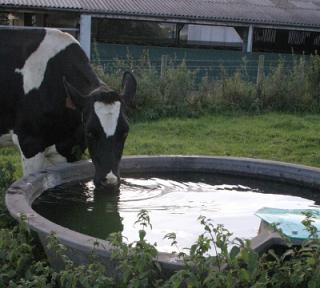Climate Change and Animal Welfare: The Good and the Bad
Published on 2 May 2013 in Climate, water and energy

Introduction
In recent years, the impact of climate change on our environment has become the subject of much debate. For the UK, rises in temperature are predicted, as well as increases in winter rainfall and an increase in frequency of ‘extreme weather events’ such as heat waves and storms. The livestock sector of agriculture is thought to one of the major producers of greenhouse gases. Consequently, there is pressure on the sector to reduce this output.
However, there is a very real risk that the altered climatic conditions will compromise animal health, welfare and productivity. The livestock sector therefore needs to adapt to changes in the climate. Firstly, we need to know how welfare will be affected. This Defra-funded project focussed specifically on assessing how animal welfare may be affected by changes in the climate.
Animals may experience thermal stress due to direct effects of changes in temperature and precipitation levels and seasonal patterns.
Additionally, there are other more indirect effects of climate change on animal welfare, such as changes in land use away from the production of livestock feedstuffs or changes in prevalence of disease and parasites. There are also changes in local and national policy with respect to livestock farming to consider.
Key Points
- The average temperature increases that are predicted for Scotland will not adversely influence the majority of grazing animals such as cattle and sheep
- However, the effects of ‘extreme events’ such as heat waves and severe storms are likely to have a greater impact. Animals that produce a lot of heat due to high growth rate, such as broiler chickens and pigs may be vulnerable if housed in unventilated sheds. Lactating dairy cows may also experience heat stress in hot periods both indoors and outdoors.
- Whilst intensively produced animals in indoor systems (poultry and pigs) may be protected against some direct thermal effects of climate change the adaptations necessary may constitute further demands upon energy and water consumption and increased GHG production
- Mortality may be high for vulnerable animals such as poultry or young chicks and piglets being transported in periods of heat wave or high temperatures, or very wet conditions
- Excessive wet, cold and windy conditions during lambing may cause increased mortality
- The predicted increase in average temperature will mean a longer grass growing period, and may improve nutrition
- It is proposed also that climate change will affect contagious disease by making conditions more favourable for the survival of certain vectors and hosts
- There are also indirect impacts on the animal, through feed availability and competition for land use. Government policies for the mitigation of climate change may also affect all those who deal with livestock
Research Undertaken
To determine how climate change would affect Scotland and other parts of the UK, we used data from UKCP08 to determine what climatic conditions would prevail up until 2080. The south-east of England will experience damaging temperatures in these timescales, while the effects on northern and western parts of the UK will not be as dramatic. However, extreme climatic events (heat waves and storms) are likely to become more common across the UK, and this will have an impact on Scottish livestock.
With these figures in mind we carried out a review to determine how animal welfare may be directly and indirectly affected by climate change. The direct effects of heat and cold on the welfare of animals is the area where there is the most published evidence. In intensive systems for pigs and poultry, the magnitude of the direct effects of climate change on welfare will be determined by the capacity and efficiency of the environmental control systems of the housing. Both increased average temperatures and an increased frequency of extreme events (both hot and cold) will potentially place increased demands upon environmental control. Animals in transport are similarly vulnerable: mortality in present conditions may be high when temperatures are high or where transporters are not equipped with suitable temperature and humidity control systems heat or cold stress may occur. It is suggested that climate change may constitute a real risk of increasing poor welfare of animals in transit and that appropriate adaptations should be developed
Beef cattle and sheep in Scotland may not be greatly affected by an average rise in summer temperature, in fact, greater grass growth may improve nutrition. However, increased lamb mortality may occur if there are extreme storm events during the lambing period. Due to their high heat output during lactation, dairy cattle may become heat stressed during heat waves. By 2080 some areas may experience summer temperatures that induce heat stress.
Certain parasites, such as liver fluke, may increase in prevalence as warmer winters promote survival of the free-living stages in the life cycle. Similarly, viruses with hosts that are temperature sensitive may increase in temperature.
There may be indirect effects on animal welfare from converting land used to crop livestock feed to biofuel, or to grow trees as carbon sinks. Policy drives to increase intensification of food production is generally associated with increased stocking density and reduction in space allowance, and a reduction in welfare.
Policy Implications
Transport and lairage regulation may need to be reconsidered in light of the potential for extreme heat and cold climatic events.
Recommendations and codes of practice for farmers, hauliers and other livestock keepers on how to cope with higher average temperatures and extreme events should be drawn up.
Government policies that promote the intensification of livestock housing and production or promote changes in land use away grassland or the production of livestock feeds should be considered from an animal welfare perspective.
Authors
Marie Haskell Marie.Haskell@sruc.ac.uk
Malcolm Mitchell Malcolm.Mitchell@sruc.ac.uk
Peter Kettlewell peterkettlewell@rocketmail.com
Eileen McCloskey Eileen.McCloskey@sruc.ac.uk
Eileen Wall Eileen.Wall@sruc.ac.uk







